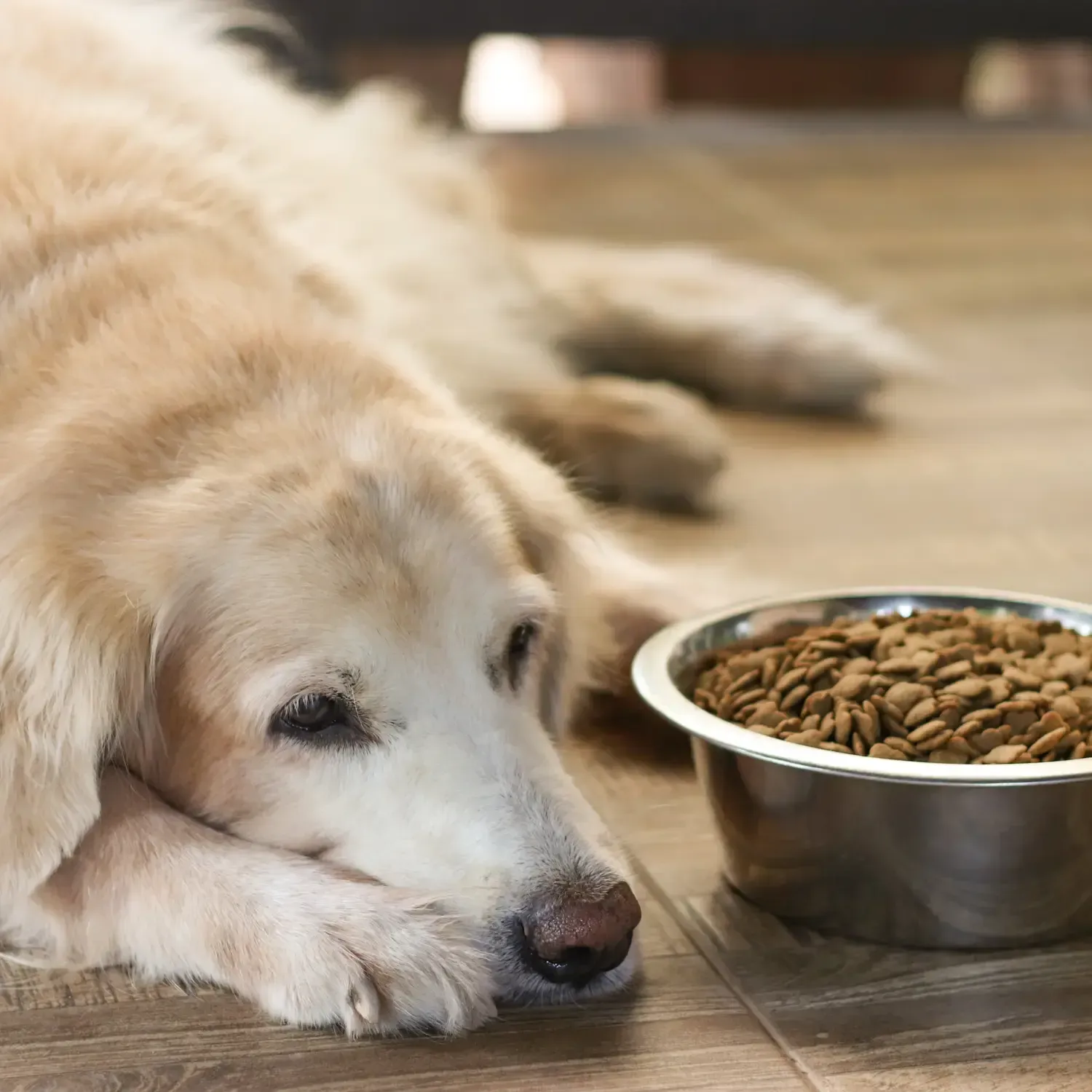Stomach upset, including vomiting and diarrhea, is a common issue in dogs that we frequently address in urgent care. While some cases can be managed with home remedies, others may require prompt veterinary attention. This article offers essential information on gastrointestinal (GI) upset in dogs and suggests effective home remedies to try before deciding whether a late-night vet visit is necessary.
Many issues can lead to GI upset in dogs, including:
- Changes in diet: Any change in your dog’s food can lead to GI upset
- Dietary indiscretion: Scavenging food from the trash or eating too much can lead to GI problems.
- Stress and anxiety: Just as in humans, stress can cause gastrointestinal upset in dogs.
- Infection: Viral and bacterial infections can cause vomiting and diarrhea.
- Foreign body ingestion: Ingesting a foreign body can lead to vomiting, retching, diarrhea, and abdominal pain.
- Toxin exposure: GI upset is a common symptom of toxin exposure.
- Food allergies: Food allergies often manifest as itchy, inflamed skin, but GI signs can also occur.
- Parasites: Intestinal parasites, such as roundworms, whipworms, hookworms, giardia and coccidia, can lead to vomiting and diarrhea.
- Bloat: Gastric dilatation-volvulus (i.e., bloat) is a life threatening, surgical emergency and can present as unproductive retching. Breeds with deep chests, such as the German Shepherd, Great Dane, Standard Poodle, and even the smaller Dachshund, are particularly prone to bloat.
- Heatstroke: Exposure to excessive temperatures can lead to vomiting and diarrhea.
- Cancer: Cancer affecting the GI tract and other organs can lead to vomiting and diarrhea.
How Can I Tell If I Should Try Home Remedies or If My Pet Needs to See a Veterinarian?
A single episode of vomiting or a couple of bouts of diarrhea might just be an isolated incident. Multiple instances of vomiting within a short time frame (less than 30 minutes) can still be considered one episode.
For adult pets without other health issues, withholding food and water for 12 hours can help rest their stomach. However, avoid this approach with puppies, small or miniature breeds, or dogs with underlying conditions without veterinary guidance. The objective is to give the GI tract a break from digestion, preventing further irritation. If vomiting subsides and diarrhea decreases during this period, you can gradually reintroduce food and water.
Generally, I recommend starting with a small amount of room temperature water. Cold water can really shock the stomach and too much water can make them feel nauseous again.
After a few hours, if the water has stayed down, begin offering a small portion of a bland diet, roughly ¼ of their usual meal size, and observe their response. An immediate reaction of vomiting, a refusal to eat, signs of lethargy or unusual behavior, a return of vomiting within 24 hours, or the reappearance of diarrhea all indicate that it’s time to schedule a veterinary appointment.
When your dog eagerly eats the small meal and shows signs of comfort and happiness, continue feeding a bland diet in small portions for 3-5 days. This gradual reintroduction helps ensure that your dog’s digestive system stabilizes, reducing the risk of further upset. Gradually reintroduce their regular diet over the next 3-5 days. However, if vomiting or diarrhea resumes after reintroducing their regular diet, it's important to have your pet evaluated by a veterinarian.
What’s the Diagnosis?
As an ER/Urgent Care veterinarian, I find this question challenging. Unless the issue has been ongoing or there's a clear explanation based on your pet's history—like getting into the trash, ingesting a known toxin, or spotting worms in the stool—we often can't determine the exact cause of gastrointestinal distress.
At the hospital, we can perform tests like bloodwork to rule out metabolic issues, assess hydration levels, and analyze stool samples for parasites and other organisms. However, in most cases, the precise cause of GI upset remains unidentified.
Should I Be Concerned About Blood?
As a pet owner, discovering blood in your dog’s vomit or stool can be incredibly alarming. If I found blood in my own stool or vomit, I would head straight to the doctor! But have you ever noticed that your veterinarian often doesn’t seem as worried?
While we don’t want to ignore this symptom, we don’t get QUITE as worked up about it. The cells that line the stomach and colon in our pets are just more likely to bleed than in their human counterparts, so we see it even with simple GI upset.
Regardless, pets with bloody stools or vomit should never be ignored and must be evaluated by a veterinarian. Significant symptoms, such as bright red blood in vomit, stools resembling “raspberry jam,” vomit that looks like coffee grounds, or dark, tarry stools, can indicate a serious underlying condition that requires immediate attention.
What Is a Bland Food Diet, and How Can I Make It?
A bland diet is a temporary feeding plan for pets that consists of foods that are easy to digest and low in fat and fiber. The goal is to help a pet’s digestive system recover from issues like vomiting and diarrhea, slowing stool production and not putting strain on the GI tract.
Bland diets are typically made up of two ingredients: a single carbohydrate source and a single lean protein source, the most common being boiled chicken and rice. If you don’t want to make your own bland food diet, prescription bland food diets are sold through veterinarians. These have the right balance of protein, fat, and fiber to help support healthy digestion.
Many of these diets have been proven to help pets recover more quickly from such issues. Since they are only available with a prescription, a valid veterinarian-patient-client relationship (VPCR) is required.
Other protein sources include: boiled hamburger (as lean as possible, boiled to remove fat then drained), low fat cottage cheese, egg whites.
Other carbohydrate sources include: boiled/steamed sweet potatoes, boiled spaghetti, minute rice
What Medications Should I Avoid at Home?
Whenever experiencing signs of an upset stomach, we often reach for over-the-counter medications designed to relieve nausea, heartburn, indigestion, and diarrhea. While these may be safe for humans, many of these medications can be dangerous for dogs. Always consult your veterinarian before giving any human medication to your pet.
- Pepto Bismol: Pepto Bismol can turn your dog’s stools a greenish-black color, which can create difficulty for the veterinary team to evaluate the stool. In addition, Pepto tablets are radio-opaque on x-rays (which means they can be seen on x-ray), and can be mistaken as a foreign body.
- Imodium: Imodium treats diarrhea by acting on the smooth muscle of the digestive tract. It slows digestive motility, which is the natural forward muscle movement that moves food through the body. Because Imodium slows GI motility, Imodium is not recommended in situations where diarrhea is due to bacteria, viruses, or parasites because is prevents the offending agent from passing and being excreted in a timely manner, which can cause inflammation of the intestines.
Imodium may also not be safe for certain dogs. Dogs with the MDR1 gene mutation (Collies, Shelties, Australian Shepherds) should not take Imodium due to difficulty metabolizing this medication, which can then lead to toxic levels in the body.
Imodium should also be used with caution in dogs with hypothyroidism, Addison’s disease, certain respiratory conditions, or brain injuries, since they are more susceptible to possible side effects including constipation, bloating, lethargy, pancreatitis, impaired motility and weight loss.
- Pepcid: Pepcid has potential side effects that include inappetence, vomiting, diarrhea, and drowsiness and is contraindicated for dogs who take certain chronic medications.
Ruby Veterinary Urgent Care is Here to Help!
Whether you've tried the home remedies suggested here or prefer to have your dog evaluated immediately, Ruby Veterinary Urgent Care is here to assist you. Feel free to call, book an appointment online, or walk right in — we're ready to help you and your pet find the relief you need. Opening in Metro Atlanta in early 2025!

